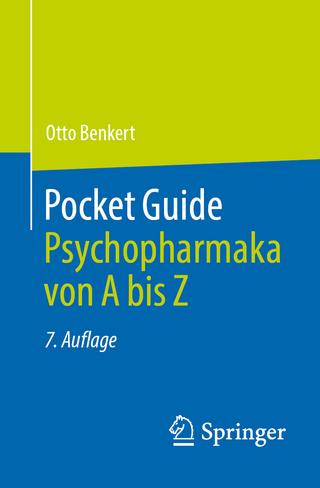
The Oxford Handbook of Nonsuicidal Self-Injury
Oxford University Press Inc (Verlag)
978-0-19-761127-2 (ISBN)
- Lieferbar (Termin unbekannt)
- Versandkostenfrei
- Auch auf Rechnung
- Artikel merken
The Oxford Handbook of Nonsuicidal Self-Injury is a compendium of up-to-date research and knowledge of topics germane to the field of NSSI. Edited by renowned scholars Elizabeth E. Lloyd-Richardson, Imke Baetens, and Janis L. Whitlock, the handbook brings together cutting-edge research from a group of internationally distinguished scholars. It covers a wide array of topics including epidemiology, function, neurophysiological processes, lived experience, and intervention and prevention approaches. Each chapter offers a critical review of the literature and ample discussion of key discoveries, perspectives, and future directions of clinical and research efforts as well as powerful intervention and prevention implications for a wide variety of populations.
This comprehensive text will serve as a go-to guide for scholars, clinicians, and anyone with interest in understanding, treating, and preventing self-injury.
Elizabeth E. Lloyd-Richardson, PhD, is a Professor of Psychology at the University of Massachusetts Dartmouth, conducting research in areas of health behavior change, such as improving young adults' health, wellness, and resilience skills, and reducing self-harm behaviors. Imke Baetens, PhD, is an Associate Professor in the Faculty of Psychology and Educational Sciences at Vrije Universiteit Brussel, Belgium, and a licensed family therapist. She is also the Founder and Academic Director of the Brussels Consultation Center (BRUCC). Baetens specializes in behavioral and emotional problems in adolescence. Janis L. Whitlock, PhD, is the Founder and Director of the Cornell Research Program on Self-Injury and Recovery. She is also Research Scientist Emerita at Cornell University and currently consults with schools, organizations, and individuals interested in enhancing the mental health and well-being of adolescents and young adults.
Chapter 1: Introduction
Elizabeth Lloyd-Richardson, Imke Baetens, and Janis Whitlock
Chapter 2: NSSI in the DSM-5
Greg Lengel, Brooke A. Ammerman, and Jason Washburn
Chapter 3: A Comparison of the Theoretical Models of NSSI
Kirsty Hird, Penelope Hasking, and Mark Boyes
Chapter 4: Direct and Indirect Self-Injury
Lotte Rubæk and Bo Møhl
Chapter 5: Theoretical Models Linking NSSI to Suicide
Sarah E. Victor, Kirsten Christensen, and Terry H. Trieu
Chapter 6: The Functions of Nonsuicidal Self-Injury
Peter James Taylor, Katie Dhingra, Kelly-Marie Peel-Wainwright, and Kathryn Jane Gardner
Chapter 7: The Epidemiology of Nonsuicidal Self-Injury and Self-Harm in Non-Clinical Samples: Population-Level Trends
Louise Staring, Glenn Kiekens, and Olivia J. Kirtley
Chapter 8: Overview and Epidemiology of NSSI in Clinical Samples
Jennifer J. Muehlenkamp and Victoria Tillotson
Chapter 9: NSSI and Self-Harm Behavior and the COVID-19 Pandemic
Amy Brausch and Rebekah Clapham
Chapter 10: Cross-Cultural Representations of NSSI
Marc Stewart Wilson
Chapter 11: Stairway to Heaven: NSSI as an Addiction
Hilario Blasco-Fontecilla
Chapter 12: A Roadmap Overview of the Research Domain Criteria (RDoC): A Shift from Diagnostic to Transdiagnostic Processes
Tim Bastiaens and Laurence Claes
Chapter 13: Negative Affect and Nonsuicidal Self-Injury
Benjamin A. Swerdlow, Jennifer G. Pearlstein, Devon B. Sandel, and Sheri L. Johnson
Chapter 14: The Brain and Body's Threat System Functioning in Those With NSSI
Katherine A. Carosella, Andrea Wiglesworth, Zeynep Basgöze, Kathryn R. Cullen, and Bonnie Klimes-Dougan
Chapter 15: Positive Valence Systems and Nonsuicidal Self-Injury
Laurence Claes, Koen Luyckx, and Glenn Kiekens
Chapter 16: Cognitive Systems in NSSI and Co-Occurring Conditions
Morgan E. Browning and Jennifer J. Muehlenkamp
Chapter 17: Social Processes in Nonsuicidal Self-Injury
Maria Zetterqvist and Johan Bjureberg
Chapter 18: Autonomic Nervous System Function in Nonsuicidal Self-Injury - A Research Domain Criteria Perspective on the Arousal/Regulatory Systems
Christine Sigrist, Michael Kaess, and Julian Koenig
Chapter 19: Bridging Brain and Behavior: Using Biology to Inform NSSI Interventions
Mindy Westlund Schreiner, Summer B. Frandsen, Nicolette C. Molina, and Alina K. Dillahunt
Chapter 20: Lived Experience Perspectives on Self-Injury: Current Evidence and Practical Applications
Penelope Hasking, Therese E. Kenny, and Stephen P. Lewis
Chapter 21: Beyond "Stopping": Reconceptualizing NSSI Recovery in Favor of Healing and Growth
Janis Whitlock, Josie Woolsen, and Elizabeth Lloyd-Richardson
Chapter 22: The Dynamics and Perception of Pain During NSSI
Edward A. Selby and Christopher Hughes
Chapter 23: The Role of Self and Blood in Ritual and Non-Ritual Self-Injury
Annette Hornbacher, William Sax, Janina Naoum, and Christian Schmahl
Chapter 24: The Significance of Site of Self-Injury
Kathryn Jane Gardner, Caroline Clements, Harriet Bickley, Gillian Rayner, and Peter James Taylor
Chapter 25: NSSI in Elementary School Children
Lisa Van Hove, Imke Baetens, Amanda Simundic, Elana Bloom, and Nancy Heath
Chapter 26: NSSI in Adolescence and Emerging Adulthood
Glenn Kiekens, Penelope Hasking, and Laurence Claes
Chapter 27: Understanding and Working With Adults who Self-Injure
Margaret Andover, Hae-Joon Kim, Vincent Corcoran, Michelle Hiner, Ana Rabasco, and Joshua DeSon
Chapter 28: Understanding and Treating Atypical, Severe Nonsuicidal Self-Injury
Barent W. Walsh, Leonard Doerfler, and Lisa Van Hove
Chapter 29: NSSI in Older Adults
Lisa Van Hove, Imke Baetens, Chloe A. Hamza, Eva Dierckx, An Haekens, Lila Fieremans, and Steven Vanderstichelen
Chapter 30: What Do US National Data Tell Us About People With Intellectual and Developmental Disabilities Who Self-Injure?
Valerie J. Bradley, Dorothy Hiersteiner, David A. Rotholz, and Henan Li
Chapter 31: Self-injury in Prison Populations
Natalie Winicov
Chapter 32: NSSI Among Military Service Members and Veterans
Molly Gromatsky, Adam J. Mann, Nathan A. Kimbrel, and Kirsten H. Dillon
Chapter 33: NSSI Among Sexual and Gender Diverse Youth
Lindsay A. Taliaferro, Megan L. Rogers, and Lucas Zullo
Chapter 34: Understanding the Link Between Direct and Indirect SIB
Bo Møhl and Lotte Rubæk
Chapter 35: An Integrated Cognitive-Emotional Perspective of NSSI
Kate Tonta, Danyelle Greene, Penelope Hasking, and Mark Boyes
Chapter 36: Intrapersonal Risk and Protective Factors for NSSI
Saskia Jorgensen, Erica A. Hart, Emily Burns, and Kathryn R. Fox
Chapter 37: Early Childhood Trauma and Nonsuicidal Self-Injuries
Gianluca Serafini, Nicolò Cipriani, Laura Costanza De Angelis, Mario Amore
Chapter 38: The Parent-Child Dyad and Other Family Factors Associated With Youth Nonsuicidal Self-Injury
Kiera M. James and Brandon E. Gibb
Chapter 39: Media Representations of NSSI
Nicholas J. Westers
Chapter 40: Understanding Online Self-Injury Activity
Tyler R. Pritchard and Stephen P. Lewis
Chapter 41: Understanding the Social Context of NSSI: Interpersonal Stress in Romantic and Peer Relationships and Peer Socialization of NSSI
Olivia H. Pollak, Matthew G. Clayton, Benjamin W. Nelson, and Mitchell J. Prinstein
Chapter 42: Social Contagion of NSSI
Stephanie Jarvi Steele, Nigel Jaffe, and Grace Murray
Chapter 43: Assessing NSSI in Clinical and Community Settings
Charlotte Cliffe, Rosemary Sedgwick, Sophie Epstein, Catherine Polling, and Dennis Ougrin
Chapter 44: Risk Assessment, Intervention, and Guidance for First Responders and Medical Settings
Nicholas J. Westers and Brittany Tinsley
Chapter 45: Novel Assessment Methods for Differentiating Those at Risk for Suicidal and Nonsuicidal Self-Injurious Behaviors
Taylor A. Burke, Brooke A. Ammerman, and Richard T. Liu
Chapter 46: Fine-Grained Assessment of Nonsuicidal Self-Injury
Nicole K. Legg, Andrew C. Switzer, and Brianna J. Turner
Chapter 47: Guidelines, Policies, and Recommendations for Responding to NSSI in Schools and Universities
Imke Baetens, Elizabeth Lloyd-Richardson, Dariya Bezugla, Elana Bloom, Chloe A. Hamza, Penelope Hasking, Stephen P. Lewis, Esther Meers, and Lisa Van Hove
Chapter 48: Promising Approaches in Prevention and Intervention in Secondary School Settings
Julia Petrovic, Laurianne Bastien, Jessica Mettler, Elana Bloom, Chloe A. Hamza, and Nancy Heath
Chapter 49: Promising Approaches to Prevention and Intervention in University Settings
Alexandra L. Morena, Akshay V. Trisal, and Elizabeth Lloyd-Richardson
Chapter 50: Digital Interventions for Nonsuicidal Self-Injury
Kaylee P. Kruzan and Janis Whitlock
Chapter 51: Machine Learning for Detection, Prediction, and Treatment of Nonsuicidal Self-Injury: Challenges and Future Directions
Shirley B. Wang, Walter Dempsey, Rowan A. Hunt, and Matthew K. Nock
Chapter 52: Managing NSSI Across Different Treatment Contexts
Franziska Rockstroh and Michael Kaess
Chapter 53: Medical and Pharmaceutical Interventions in NSSI
Paul L. Plener
Chapter 54: Online Approaches to NSSI Treatment
Jill M. Hooley and Kathryn R. Fox
Chapter 55: Application of the Unified Protocol for Treatment of NSSI
Kate H. Bentley and Adam C. Jaroszewski
Chapter 56: Cognitive Behavioral Approaches and Dialectical Behavioural Therapy to Treat NSSI
Alexander L. Chapman, Philippa Hood, and Cassandra J. Turner
Chapter 57: Family Therapy for NSSI
Imke Baetens, Lisa Van Hove, and Tinne Buelens
Chapter 58: Mentalizing and Psychoanalytic Approaches
Anna Motz, Anthony Bateman, Patrick Luyten, and Peter Fonagy
Chapter 59: Experiential Therapies and Nonsuicidal Self-Injury
Victoria E. Kress, Julia Whisenhunt, Nicole A. Stargell, and Christine A. McAllister
Chapter 60: Collaborative-Strengths Based Family Therapy With Nonsuicidal Self-Injuring Adolescents and Their Families
Matthew D. Selekman
Chapter 61: Overview of Advances in the NSSI Research Field, and Thoughts on the Future of NSSI Research
Elizabeth Lloyd-Richardson, Imke Baetens, and Janis Whitlock
| Erscheinungsdatum | 09.04.2024 |
|---|---|
| Reihe/Serie | Oxford Library of Psychology |
| Zusatzinfo | 17 illustrations |
| Verlagsort | New York |
| Sprache | englisch |
| Maße | 178 x 251 mm |
| Gewicht | 2087 g |
| Themenwelt | Geisteswissenschaften ► Psychologie ► Klinische Psychologie |
| Sozialwissenschaften ► Pädagogik ► Vorschulpädagogik | |
| ISBN-10 | 0-19-761127-3 / 0197611273 |
| ISBN-13 | 978-0-19-761127-2 / 9780197611272 |
| Zustand | Neuware |
| Informationen gemäß Produktsicherheitsverordnung (GPSR) | |
| Haben Sie eine Frage zum Produkt? |
aus dem Bereich


